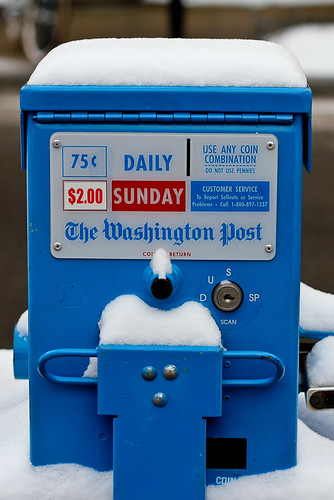
Congratulations, Jeff Bezos, you just bought yourself a newspaper.
Even the most stalwart defenders of The Washington Post would agree that the current business model is untenable. It was high-minded journalism made possible thanks to the generous support of low-brow classifieds. Garage sale ads paid for Woodward and Bernstein.
But Craigslist stole that income stream years ago. Newspapers thought they were better than that. They were wrong.
For a while, the paper made do with support from its test-preparation service and other dubious schemes while it flailed about for a winning strategy.
It never found it. Print subscribers deserted the paper and digital ads never amounted to much. The Post used to be the paper of record, augustly informing the imperial capital what was news and what wasn’t.
Those days are over, and thank god. Instead, readers have the power. We decide what’s important.
Still, a city needs a newspaper, right? Wrong – we need journalism. It doesn’t matter whether it’s paper or electrons, tweeted or printed, we need the old-fashioned work of writers, editors and photographers.
Bezos buying WaPo is an endorsement of that view. He bought journalism, with an eye for reinventing it like he reinvented online shopping and book publishing.
What should he do? As a DC resident, long-time reader of the Post and freelance writer, I’ve got some ideas:

1. Create a weekend edition of the Express
Reading the Washington Post Express is a daily routine for tens of thousands of Washington commuters. We get up, pick up a copy of this free paper, and then read it while we’re stuck in the Metro. We’re literally a captive audience, stuck underground, as we endure the latest Metro calamity.
But it’s a Monday-Friday paper and underutilized asset. I suggest creating a weekend edition, targeted to a different audience – tourists and people coming into the city for the weekend. Make it a fun guide to the weekend’s events, something that people can take with them.
And include a map in each issue, to help people navigate Washington’s yuppie delights.
2. Double the pay of Express distributors
Rain or shine, you can find a friendly face handing out copies of the Express every weekday morning at Metro stations. With a stack of papers and a hearty hello, they are Washington Post brand ambassadors – and deserve to be paid accordingly.
Double their pay as a goodwill gesture. Reward the face of your brand. Doing so will address the accusation that Amazon is anti-worker. Also, these brand ambassadors might just solve the last-mile problem. If they can hand out papers, they can hand out other things as well.
3. Fire Ezra Klein
No one embodies the mediocre state of the news like Ezra Klein. A reliable stenographer for Washington’s elite class, he is a journolist who got caught trying to fix news coverage. He and his cohorts sought to deny the rest of us the truth.
Straddling the line between reportage and advocacy, he exists in the chummy East Coast world of liberal groupthink, where Washington insiders pass seamlessly between politics, media and government.
Let him pursue his inevitable destiny, as a lead-in for hoaxer Al Sharpton or as a particularly mendacious Obama press secretary.
4. Hire Glenn Greenwald
With his NSA exposes, Greenwald is a true muckraker who lives up to the crusading ideals that the Washington Post was once known for (where was the paper, BTW?). Greenwald risks Gitmo to get the story. He believes in something and is willing to put his life on the line to cover it – how many DC reporters would do the same?
He’s prickly, and an asshole, but isn’t that what you want a journalist to be?
5. Kill the paywall… forever
The paywall is twenty years too late. News has escaped its bounds and can now be found everywhere. Why pay for something I can get for free?
And like many of the Post’s digital initiatives, the paywall is a sloppy, second-best effort full of holes and loopholes. Work in government – no paywall for you! There are so many exceptions that I wonder who the fool is who actually pays for the paper online.
Kill it. And swear that it will never return. Like Facebook, promise that the Washington Post will always be free online.
–
The Washington Post has been a part of my whole adult life. I read it in college between classes. Coming home late at night, I used to see the trucks lined up outside the building on 15th St, ready to deliver papers to the Washington region. Seeing my first article published in the paper was a special thrill.
I’m also an Amazon fan and a supporter of the Internet revolution. I’ve self-published two novels with Amazon. I own (and love) a Kindle Paperwhite. I work on web sites for a living.
Jeff Bezos, I wish you luck. With your customer-centric philosophy and history of innovation, you’re just the man to figure out how to make the news survive as a business. Newspapers may no longer be printed on dead trees but journalism must endure.